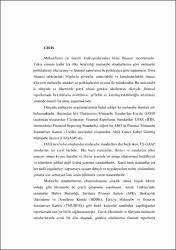Amortismanların Uluslararası Finansal Raporlama Standartlarına Göre Raporlanması Ve Türk Muhasebe Sistemi İle Karşılaştırılması
Citation
Bulca Handan''Amortismanların Uluslararası Finansal Raporlama Standartlarına Göre Raporlanması Ve Türk Muhasebe Sistemi İle Karşılaştırılması’’ ‘’Amortization Reporting According To International Financial Reporting Standards And Comparison With Turkish Account System’’ Afyon Kocatepe Üniversitesi Afyonkarahisar 2009Abstract
Uluslararası Finansal Raporlama Standartları’nın amacı ilgililerin tümüne ihtiyaca uygun, güvenilir, karşılaştırılabilir ve anlaşılabilir bilgiler sunmaktır. Dünyada ve ülkemizde muhasebe standartlarında gelişmeler yaşanmaktadır. Yeni Türk Ticaret Yasa Tasarısı, Muhasebe Standartları Kurulu (IASB) tarafından oluşturulan ve Türkiye Muhasebe Standartları Kurulu (TMSK) tarafından aynen Türkçe’ye çevrilerek yayımlanmış olan Uluslararası Finansal Raporlama Standartları’na uyulması gereğini hükme bağlamaktadır.
Finansal raporların sunduğu bilgilerden birisi de amortismanlardır. Uluslararası Finansal Raporlama Standartları’nın oluşumu amortisman konusunu da etkilemiştir. Amortisman konusu, amortismana tabi duran varlıkların değerlemesindeki değişikliklerden, amortismanlarla ilgili kavramlardan ve amortisman hesaplamada kullanılan yöntemlerden etkilenmektedir. Türkiye’de kanuni defterler Muhasebe Sistemi Uygulama Genel Tebliği esaslarına göre tutulmakta ve bilanço kalemlerinin değerlendirilmesinde Türk Vergi Sistemindeki değerleme hükümlerine uyulmaktadır.
Bu çalışmada amortismana tabi varlıkların değerleme konusu ve itfası Uluslararası Muhasebe Standardı 16: Maddi Duran Varlıklar, Uluslararası Muhasebe Standardı 38: Maddi Olmayan Duran varlıklar ve diğer Standartlarda yer alan hükümler ile Türk Muhasebe Sistemi açısından ele alınarak aralarındaki benzerlik ve farklılıklar örnekler yardımıyla karşılaştırma yapılarak analiz edilmiştir. The objective of International Financial Reporting Standards is to offer information which is relevant, reliable, comparable and understandable for the needs of everyone involved. There are recent developments in account standards in our country and worldwide. The New Turkish Trade Law Plan sentences that the International Financial Reporting Standands which are prepared by the International Account Standards Board (IASB) and translated into Turkish as it is and published by Turkish Account Standards Board (TMSK) must be obeyed.
One of the informations presented by the financial reports is depreciation. The formation of International Financial Reporting Standands influenced the depreciation subject also. The depreciation subject is effected from the valuation changes of tangible fixed assets which are subject to depreciation, the concepts related to amortizations, and the methods used to calculate amortization. In Turkey, the legal books are hold according to the basis stated in Account System Application General Communique and the evaluation of balance sheet items is done in compliance with Turkish Tax System evalution terms.
In this work, the theme of valuation of assets subject to amortization and the amortization of these assets are analyzed by making comparisons between International Account Standards 16 : Tangible Fixed Assets, International Account Standards 38 : Intangible Fixed Assets and items existing in other Standards, and Turkish Account System; in the point of similarities and differences with various examples.



















